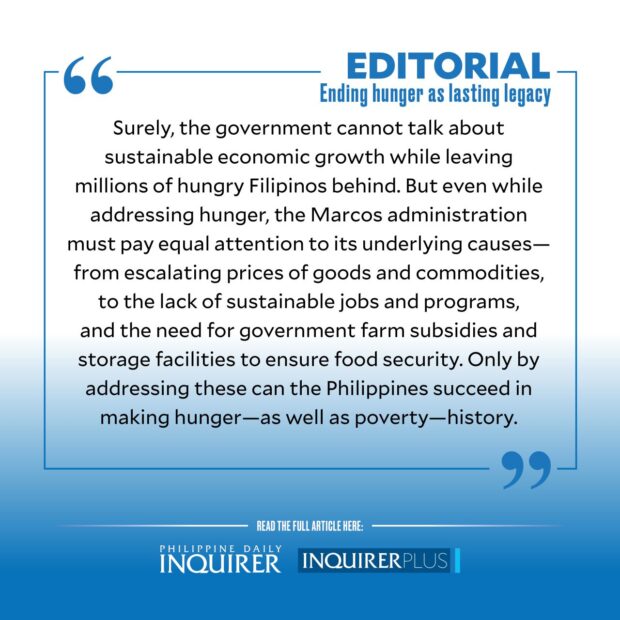Ending hunger as lasting legacy

With a freshly secured $3 million in funding from the Asian Development Bank, the Department of Social Welfare and Development (DSWD) is set to launch in July the pilot run of Walang Gutom 2027, a food stamp program meant to give the country’s poorest population “access to nutritious, delicious, and affordable food.”
Some one million families are expected to benefit from the program — the first in the Philippines and patterned after similar long-running programs in countries such as the United States — putting the administration a major step closer to achieving its ambitious target of eradicating hunger by the time President Marcos steps down from office in 2028.
“We want it to be the President’s legacy,” declared DSWD Secretary Rex Gatchalian, who early on identified the food stamp program as one of his top priorities to combat pervasive hunger and poverty in the Philippines.
Under the six-month pilot phase that will run from July to December this year, an initial 3,000 families from poor households vetted under Listahanan 3, or the third round of the nationwide assessment of poor households launched in 2022, will receive P3,000 in food credits that they can use to buy basic food items from DSWD-accredited retailers.
The families will come from chosen pilot sites identified as a former conflict area, a “geographically isolated” province, an urban poor community, a calamity-hit area, a rural poor area, and the Bangsamoro Autonomous Region in Muslim Mindanao.
Once initial kinks are ironed out and adjustments made based on the results of the pilot phase, Gatchalian said the DSWD will have the first run of Walang Gutom 2027 in the first quarter of next year that will benefit an additional 300,000 families. And so on, until the full one million families are reached by the following year.
With the magnitude of this undertaking, Gatchalian has sought the help of outside consultants and experts at the Philippine Statistics Authority to enhance the program design. Handling one million households at the same time was “trouble waiting to happen,” he acknowledged.
Indeed, the DSWD must learn from the botched and chaotic distribution of ayuda at the height of the COVID-19 lockdowns, when scarce resources went to political allies or even family members of those in charge of drawing up the distribution list. Thus, Gatchalian and his team and partners both in the national and local governments must slay the devil in the details to ensure that good intentions do not go to waste and would complement other government initiatives meant to achieve the same goal.
Mr. Marcos earlier issued an executive order reorganizing the national government’s Inter-Agency Task Force on Zero Hunger, now to be led by Gatchalian as DSWD chief, with Marcos as vice chair, given his concurrent role as head of the Department of Agriculture. The task force’s urgent tasks and lofty goals remain the same as when it was formed in January 2020 under President Duterte: to free Filipinos from hunger and achieve food security, given that hunger, undernutrition, child wasting, stunting, and mortality remain serious concerns in the country.
And more so today, as the country continues to recover from the ravages of the pandemic. Indeed, the task force’s plans for action were stalled as government attention and resources were diverted to the more pressing issues of getting the virus under control and addressing its severe health and economic impact.
As a result, while hunger levels have gone down to 9.8 percent of the population as of March this year from 11.8 percent in December 2022, as per Social Weather Stations survey results, this is still above the 8.8 percent or 2.1 million families reached in December 2019 before the pandemic hit. This means that there are still 2.7 million households suffering from involuntary hunger, defined as “being hungry and not having anything to eat.”
Clearly, Gatchalian has his work cut out for him. With a fresh mandate as head of the crucial task force to end hunger, plus the imprimatur and funding to get the food stamp program underway, he is on the right track. It will now be up to him and his team and partners to pick up where the previous administration had left off, and mobilize the entire government machinery, the private sector, and the citizens themselves to achieve its target.
Surely, the government cannot talk about sustainable economic growth while leaving millions of hungry Filipinos behind. But even while addressing hunger, the Marcos administration must pay equal attention to its underlying causes — from escalating prices of goods and commodities to the lack of sustainable jobs and programs, and the need for government farm subsidies and storage facilities to ensure food security. Only by addressing these can the Philippines succeed in making hunger—as well as poverty — history. Now that’s a legacy worth pursuing.




















